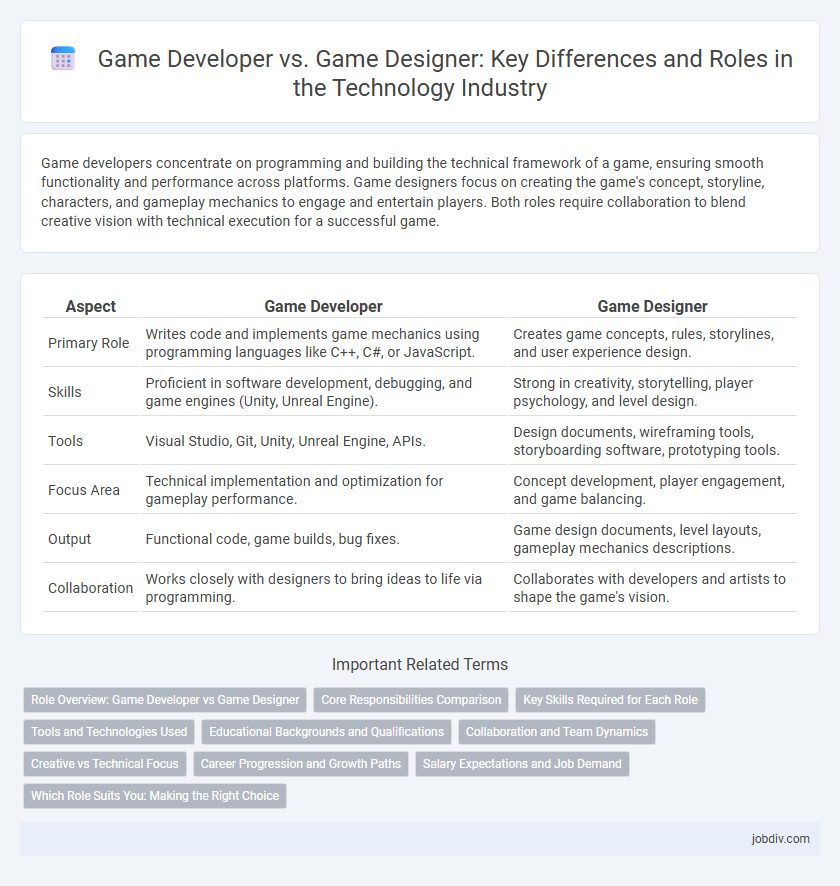Game developers concentrate on programming and building the technical framework of a game, ensuring smooth functionality and performance across platforms. Game designers focus on creating the game's concept, storyline, characters, and gameplay mechanics to engage and entertain players. Both roles require collaboration to blend creative vision with technical execution for a successful game.
Table of Comparison
| Aspect | Game Developer | Game Designer |
|---|---|---|
| Primary Role | Writes code and implements game mechanics using programming languages like C++, C#, or JavaScript. | Creates game concepts, rules, storylines, and user experience design. |
| Skills | Proficient in software development, debugging, and game engines (Unity, Unreal Engine). | Strong in creativity, storytelling, player psychology, and level design. |
| Tools | Visual Studio, Git, Unity, Unreal Engine, APIs. | Design documents, wireframing tools, storyboarding software, prototyping tools. |
| Focus Area | Technical implementation and optimization for gameplay performance. | Concept development, player engagement, and game balancing. |
| Output | Functional code, game builds, bug fixes. | Game design documents, level layouts, gameplay mechanics descriptions. |
| Collaboration | Works closely with designers to bring ideas to life via programming. | Collaborates with developers and artists to shape the game's vision. |
Role Overview: Game Developer vs Game Designer
Game developers focus on coding and programming the mechanics, physics, and interactivity of a game, utilizing languages such as C++ and Unity to bring designs to life. Game designers concentrate on conceptualizing game mechanics, storylines, and user experience, employing tools like narrative scripting and level design software to shape gameplay. Both roles collaborate closely to ensure cohesive gameplay, balancing technical implementation with creative vision.
Core Responsibilities Comparison
Game developers focus primarily on coding, programming, and technical implementation to build functional game mechanics and systems, ensuring smooth gameplay and software stability. Game designers concentrate on creating game concepts, storylines, rules, and player experiences, shaping the overall vision and engagement factors. Both roles intertwine to deliver a cohesive gaming product, with developers translating designers' creative ideas into interactive reality.
Key Skills Required for Each Role
Game developers require strong programming skills in languages such as C++, Java, and Python, along with expertise in software development tools like Unity and Unreal Engine to build and implement game mechanics. Game designers excel in creativity, storytelling, and user experience design, focusing on level design, character development, and narrative flow using tools like Adobe Creative Suite and prototyping software. Both roles need collaboration, problem-solving abilities, and a deep understanding of gaming principles to create engaging and immersive experiences.
Tools and Technologies Used
Game developers primarily utilize programming languages such as C++, C#, and Python, alongside game engines like Unity and Unreal Engine, to build the core mechanics and functionality of games. Game designers focus on tools like Adobe Photoshop, Sketch, and specialized software for storyboarding and level design to create the visual aesthetics and gameplay experience. Both roles increasingly rely on version control systems like Git and collaborative platforms such as Jira to streamline development workflows and maintain project organization.
Educational Backgrounds and Qualifications
Game developers typically possess degrees in computer science, software engineering, or related technical fields, emphasizing programming languages such as C++ and Unity. Game designers often hold qualifications in game design, interactive media, or graphic design, focusing on storytelling, user experience, and level design principles. Both roles benefit from specialized certifications and portfolios showcasing practical experience in game development tools and creative project execution.
Collaboration and Team Dynamics
Game developers and game designers collaborate closely to transform creative concepts into playable experiences, ensuring technical feasibility and engaging gameplay. Effective communication and mutual understanding of each other's roles foster seamless integration of design ideas and coding solutions, enhancing team productivity. Strong collaboration within multidisciplinary teams drives innovation, enabling the successful delivery of complex game projects on time and within budget.
Creative vs Technical Focus
Game developers primarily emphasize technical skills, including programming languages like C++ and Unity, enabling the creation of functional game mechanics and systems. Game designers focus on creative aspects, such as story development, character design, and player experience, shaping the game's narrative and engagement. Both roles require collaboration to blend technical execution with creative vision, ensuring a cohesive and immersive gaming experience.
Career Progression and Growth Paths
Game developers typically advance by mastering programming languages and development tools, moving from junior roles to specialized positions like graphics programmer or technical director. Game designers progress by honing skills in narrative creation, gameplay mechanics, and user experience, often transitioning from level designer to lead designer or creative director. Both career paths offer opportunities for cross-disciplinary growth, with potential shifts into producer or project management roles within the gaming industry.
Salary Expectations and Job Demand
Game developers typically earn an average salary ranging from $70,000 to $120,000 annually, driven by high demand for software programming skills in the gaming industry. Game designers, focusing on conceptualizing gameplay and user experience, earn slightly less, with salaries averaging between $60,000 and $100,000, but experience growing job demand due to the increasing emphasis on immersive storytelling. Both roles show strong future employment prospects, fueled by the expansion of augmented reality, virtual reality, and mobile gaming markets.
Which Role Suits You: Making the Right Choice
Choosing between game developer and game designer depends on your skills and interests; game developers focus on coding, programming languages like C++ or Unity, and technical problem-solving, while game designers concentrate on crafting gameplay mechanics, storytelling, and user experience. Game developers need strong proficiency in software development and debugging, whereas designers require creativity and an understanding of player psychology and level design. Evaluating your passion for either technical implementation or creative conceptualization will guide you in making the right career choice in the gaming industry.
Game Developer vs Game Designer Infographic

 jobdiv.com
jobdiv.com